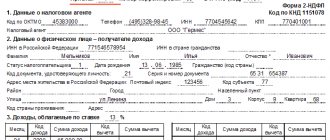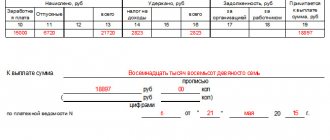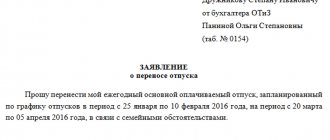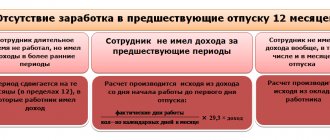Procedure for granting leave
The legal basis for regulating the relationship between employee and employer is the Labor Code of the Russian Federation, letters and orders of the Ministry of Labor of the Russian Federation.
The State Labor Inspectorate (SIT) checks compliance of the parties to labor relations with the law, and fines for its violation on the basis of the Code of Administrative Offenses of the Russian Federation. Before we find out what sanctions the State Tax Inspectorate can impose on a company for failure to provide leave, let’s figure out who gets the right to go on leave and when.
An employee can apply for rest in the form of vacation after six months of continuous work in the company. If the manager does not mind, then leave can be obtained earlier (Article 122 of the Labor Code of the Russian Federation).
In the future, vacation is provided in accordance with the vacation schedule - the company annually forms it in December for the next calendar year.
You will find a form and sample of filling out the schedule in this article.
The vacation schedule is approved by order of the manager and is given against signature for review by each worker. From this moment on, the schedule is a mandatory document for both the employee and his management. Its absence is a reason for a fine from the State Tax Inspectorate.
ATTENTION! A number of employees have the right to demand vacation days at any time:
- minors (Article 267 of the Labor Code of the Russian Federation);
- women before and immediately after maternity leave, as well as immediately after parental leave (Article 260 of the Labor Code of the Russian Federation);
- men - during their wife’s maternity leave (Article 123 of the Labor Code of the Russian Federation);
- Chernobyl victims (clause 5 of article 14 of the law of the Russian Federation of May 15, 1991 No. 1244-1) and some other workers.
For each year of work, the employee is entitled to leave of at least 28 calendar days (Article 115 of the Labor Code of the Russian Federation).
Find out more about calculating length of service for annual leave here.
The vacation period can be divided, but one of the parts must be at least 14 days.
ConsultantPlus experts explained what sanctions an employer can face for non-compliance with the vacation schedule. If you do not have access to the system, get trial online access and upgrade to the Ready Solution for free.
A number of categories of employees may qualify for additional days of rest - find out about this in the publication “Annual paid leave under the Labor Code (nuances)”.
The concept of “vacation in advance” and its legislative framework
There is no official term “vacation in advance” in Russian legislation. Annual paid leave, guaranteed to each employee by the Labor Code (Article 122), is earned for 1 working year. It is counted not from the beginning of January, but from the date of registration of the employment contract, that is, it is individual for each employed person.
An employee can go on this leave after completing six months of work experience (the provisions of Article 122 of the Labor Code of the Russian Federation) or earlier, in agreement with the employer. It is not difficult to calculate that during this time, at best, only half of the officially established vacation duration will be worked. It turns out that the second half, if the vacation is not divided into parts, the employee receives in advance.
If the length of service is less than 6 months, then the advance payment of vacation days provided is even longer.
In the second and subsequent years of work, vacation is given according to the schedule at any time; length of service no longer matters, so vacation is often assigned in advance.
FOR YOUR INFORMATION! International Labor Organization Convention No. 132 on Holidays with Paid, which the Russian Federation ratified in 2010, states that an employee can receive leave from any day of his employment for a duration proportional to the time worked. However, many employers give preference to the norms of the Labor Code of the Russian Federation, which are legally “above” the conventional ones. The Labor Code does not deprive the employer of the right to allow early leave, and, regardless of the time worked, it allows you to receive it in full.
Thus, it is possible to define leave provided in advance as annual paid time for legal absence from the workplace, received before the moment of its actual working out.
In what cases can an employee go on vacation be postponed?
Annual leave can be extended (or postponed by agreement between the employer and employee) in the following situations:
- the worker is sick;
- the worker performs state duties - if they require release from the main job;
- the employer forgot to notify the subordinate 2 weeks in advance about the upcoming start of the vacation;
- the employer did not pay vacation pay on time (3 working days);
- in other situations provided for by federal legislation and local regulations (Article 136 of the Labor Code of the Russian Federation).
For more information about shifting vacation days due to illness, read the publication “How to arrange a transfer of vacation due to sick leave.”
If an employee’s going on vacation negatively affects the organization’s business activities, then it is permissible to transfer the vacation period to the next working year.
Can a director not allow you to go on vacation as scheduled due to production needs and other vacation issues - on our forum.
The transfer of vacation leave at the request of the employee is documented based on the employee’s application and the order of the manager. If the change in vacation dates is due to production needs, then the personnel service or accounting department must have the employee’s written consent to the change. For the convenience of both parties to the labor relationship and to minimize disputes, do not forget to indicate the new period of the employee’s vacation in the manager’s order to postpone the vacation.
An employee must be allowed to go on vacation no later than 12 months after the end of the working year for which he is entitled to go on vacation (Article 124 of the Labor Code of the Russian Federation). Transferring vacation is an exceptional measure and should not be practiced constantly; the employer may receive a fine for shifting vacation from year to year.
Transferring vacation to next year
Expert consultation
The vacation period is ending. Many workers are concerned about the question of whether it is possible to transfer vacation to the next working year. Employers are concerned about an equally important question: what to do with employees who, for one reason or another, were unable to take their vacation on time. Our expert Tatyana Almazova explained the most pressing aspects of the above problems.
***
Reasons for transferring vacation
Depending on the circumstances, vacation can be postponed either at the initiative of the employer or at the initiative of the employee. It should be noted that labor legislation does not provide for the employer’s right to unilaterally deprive an employee of vacation in the current year, thereby increasing the period between legal vacations. In any case, no matter which party the initiative comes from, the opinion of the other party to the labor relationship must be taken into account.
So, it is possible to deviate from the vacation schedule if:
- the employee’s illness occurred during the vacation period;
- the employee could not take advantage of leave due to fulfilling his civic duty, for example, serving as a juror;
- other cases are provided for by local acts of the employer or such an obligation is established by the Labor Code.
Transfer of leave at the initiative of the employer
The employer’s right to postpone vacation, although provided for by law, is, as noted above, not unlimited. As a rule, a transfer occurs when an emergency arises, when, due to the absence of a certain employee at the workplace, the entire production may come to a standstill. This could be an accident or other emergency situation within one enterprise.
However, even in this case, it is necessary to obtain the employee’s consent; you cannot immediately proceed to registering the transfer. In addition, if the employee has not reached the age of 18 or the working conditions are not normal, the transfer of leave remains prohibited and subject to consent. It is especially necessary to note the risk of prosecution in connection with failure to provide leave for more than two years in a row. This situation is unacceptable and threatens the employer with a fine of up to fifty thousand rubles.
Transfer of leave at the employee's initiative
In our opinion, the most common case of refusal of annual leave at the request of the worker himself is his illness. It’s worth saying right away that the illness of a child or another family member cannot become a reason for changing the vacation schedule.
If a certificate of incapacity for work is issued, the vacation can be postponed either to the period immediately after the end of the temporary incapacity for work, or to any other period by agreement of the parties.
The next basis specified in the Labor Code of the Russian Federation is the fulfillment of state duties. Such cases include, in particular, participation in court as a witness or juror, or work on an election commission.
Other cases, in our opinion, include, for example, the coincidence of an intermediate certification at an educational institution with a vacation period, or a medical examination, if such grounds are provided for by a local act.
Transfer of vacation by agreement of the parties
There are situations when the provision of leave in the current working year does not meet the interests of either party to the labor relationship. For example, an employee has an event coming up after a certain time in which an extension of vacation would be most welcome. In this case, the transfer of the rest period is not directly provided for by the Labor Code, however, there is no prohibition on the transfer. We believe that the basis for the transfer in the current situation will be a statement in which the start date of the vacation should be indicated. The employer should evaluate the possibility of a transfer and make a decision based on the circumstances.
Transferring part of the vacation
In most cases, it becomes necessary to transfer not all annual leave, but only part of it. This situation is not properly covered by legislation, but nevertheless it also occurs. In such cases, the general grounds for transferring leave provided for by labor legislation should be applied.
It is necessary to take into account that one of the parts of a divided vacation must be at least fourteen days in a row, and the total number of parts is not regulated by law. However, according to the Ministry of Labor, division into a large number of parts can lead to the fact that the employee will not be able to rest.
Transferring preferential leave
Often, additional vacation remains unfulfilled. Such leaves are provided for hazardous working conditions, minor employees, employees with special working conditions and some other categories. Of the listed categories, it is prohibited to transfer additional leave only to employees with hazardous working conditions. Here there is a clear connection between the work performed and the need for timely rest, since otherwise the employee’s health may suffer.
Registration of vacation transfer
To give legitimacy to the transfer of leave, it is necessary, first of all, to inform the employee about this need and obtain his consent. Next, the corresponding order is issued and the data is entered into the personal card.
Making changes to the vacation schedule
In case of postponement of vacation, it is necessary to make changes to the vacation schedule. To do this, in column 8 “Bases” you must enter the details of the order to transfer the vacation, in column 9 “Date of the intended vacation” indicate the desired start date of the vacation. Since the vacation is transferred to the next year, the new vacation schedule must reflect the days postponed from the current year.
Postponement of vacation for several years in a row
It is impossible to deprive an employee of vacation every year, even on his initiative. However, this situation can be avoided if you provide in the current year an unpaid vacation period for the previous year, and transfer the vacation for the current year to the next, thereby preventing the possibility of being held liable for failure to provide vacation for more than two years in a row.
Providing vacations for the previous and current years sequentially
If vacations are accumulated over several years in a row, the employee has the right to include them in the vacation schedule sequentially, that is, one after the other, or distribute them throughout the year. In both the first and second cases, the employer, when approving the vacation schedule, has the right to agree on the specified periods or adjust them. Once approved, the schedule becomes binding on both parties to the employment contract.
Compensation for the postponed part of the vacation
An employee has the right to count on compensation only if the transferred part of the vacation exceeds 28 days for each working year. For example, an employee in 2022 postponed 10 calendar days to 2021. As a result, it turned out that in 2022 the employee will be on vacation for 28 calendar days for the current year + 10 days for the previous year. It would seem that compensation can be obtained. However, this is not the case, since vacation days (10 and 28 days) fall in different working years, accordingly, compensation will be contrary to the law. In case of postponement of additional leave, compensation can be paid since the main 28 days have already been provided.
In conclusion, we note that for violation of the rules for transferring vacation, the employer may be held liable by the Code of Administrative Offenses of the Russian Federation. In addition, the employee has the right to go to court with claims for compensation for moral damage. Please note that administrative liability arises for each fact of violation.
By the way, here we talked about recording working hours and remuneration during a shift schedule.
Question
What are the reasons for postponing vacation to next year?
Answer
It is possible to deviate from the vacation schedule if the employee’s illness occurred during the vacation period; the employee could not take advantage of leave due to fulfilling his civic duty, for example, serving as a juror. Other cases are provided for by local regulations of the employer or such an obligation is established by the Labor Code of the Russian Federation. This follows from Article 124 of the Labor Code of the Russian Federation.
The ConsultantPlus reference and legal system will help you avoid negative consequences in the procedure for rescheduling your vacation.
In ConsultantPlus you can find step-by-step instructions on this procedure and samples of filling out personnel documents.
Watch a video on this topic on our YouTube channel.
Tatyana Almazova, leading legal consultant at Chto Delat Consult LLC
Fine for failure to provide leave for more than two years
The Labor Code of the Russian Federation prohibits not providing annual paid leave to an employee for 2 years in a row, and prohibits minor workers and those engaged in activities with hazardous working conditions from providing leave in principle (Article 124 of the Labor Code of the Russian Federation).
Administrative liability is established for these violations:
| Intruder | Amount of sanctions, rub. | Base | |
| First violation | Repeated violation | ||
| Entity | 30 000–50 000 | 50 000–70 000 | Part 1 Art. 5.27 Code of Administrative Offenses |
| Individual entrepreneur or official | 1 000–5 000 | 10,000–20,000 or disqualification for a period of 1 to 3 years (for officials) | Part 2 Art. 5.27 Code of Administrative Offenses |
The statute of limitations for violation is 1 year.
If a company breaks the law and does not send workers on vacation, then at the end of the calendar year, vacation days do not disappear anywhere, but remain the organization’s debt to the employee.
Example
For 4 years from the moment of employment of programmer Igor Valentinovich Vasilchenko, Sigma LLC did not provide him with leave, citing the fact that Vasilchenko is a valuable employee and is constantly needed by the company. Therefore, the programmer has the right to 4 × 28 days = 112 calendar days of vacation (Igor Valentinovich does not belong to the category of beneficiaries entitled to additional days). If Vasilchenko decides to resign from Sigma LLC, then the company will have to pay monetary compensation for the programmer’s unused vacation, and not for 1 year, but for all 4 - 28 days for each.
Unused vacation days for previous years of work are provided to the employee in the current calendar year:
- or as part of the vacation schedule;
- or by agreement between the employee and his management (the worker writes an application for leave, indicating the number of unused days of rest, and the employer endorses the application and issues an order for leave).
During a calendar year, an employee can use several vacations (letter of the Ministry of Finance of the Russian Federation dated May 13, 2010 No. 03-03-06/4/55).
Accounting must calculate vacation pay and issue it 3 days before the start of the vacation.
We talk about how to do this in this article.
What to do if an employee does not want to go on vacation
There are often situations when the employee himself does not want to rest and refuses to go on vacation. As we have already found out, such hard work is fraught with fines for the company. What should I do?
First, make sure that you have a vacation schedule and that the stubborn person is familiar with it. The schedule is mandatory not only for the employer, but also for all employees. And if a worker refuses to go on vacation in accordance with the schedule, this is a violation of labor discipline, punishable in accordance with local regulations and legislation of the Russian Federation (Article 192 of the Labor Code of the Russian Federation). The employer has the right to give the employee at least a reprimand.
But in which case a violator can be fired, read the material “Labor Discipline and Responsibility for Its Violation.”
An employee’s unauthorized departure from work during the period of leave must be recorded in order to eliminate future disputes about payment. This can be done by a human resources employee or an accountant. In order to stop all discussions, you can completely order the company’s security service or the employee’s immediate supervisor not to allow the worker to enter the workplace during vacation days.
ATTENTION! You can send an employee on vacation only with his consent - this is the fact of familiarization with a receipt with the vacation schedule or the manager’s order to send the employee on vacation.
Some employers, trying to get out of a situation where an employee wants to continue working without violating the Labor Code, arrange a vacation period for weekends. That is, the employee divides his annual paid leave into several parts, one of which, by law, cannot be less than 14 days (Article 125 of the Labor Code of the Russian Federation), and he takes the remaining parts on weekends.
For example, if an employee works a 5-day shift, then the accountant issues him 2 days of vacation every week - on Saturday and Sunday, until the employee uses all the allotted vacation days. In this way, the employee will exercise the right to leave and will work at the same pace.
The Labor Code of the Russian Federation does not directly prohibit such a scheme. However, inspectors may still consider this practice a violation of the law: weekends and annual paid leave are different types of rest time (Articles 106, 107 of the Labor Code of the Russian Federation). By issuing a day off, even at the request of the employee, the employer reduces the number of days of rest for the subordinate, which leads to an actual increase in working hours and infringement of the employee’s rights (paragraph 6, 12 of Article 21 of the Labor Code of the Russian Federation). The Ministry of Labor draws attention to this, in particular. Therefore, we recommend that you practice this method of providing vacation: give the employee vacation days on weekends, taking 2 adjacent days - Friday and Monday (with a five-day work week).
The employee may ask you to replace the vacation period with a cash payment. This is also prohibited by law - compensation in lieu of vacation is allowed only for days over 28 calendar days of the annual vacation period. An employee can receive money instead of vacation only upon dismissal - in the form of compensation for unused vacation (Article 127 of the Labor Code of the Russian Federation).
How is leave provided to employees?
Leave is provided to employees as standard. According to Article No. 123 of the Labor Code, every year the management of the enterprise must develop a vacation schedule, taking into account the opinion of the trade union organization.
Such a document should be approved no later than two weeks before the start of the new calendar year. Two weeks before sending a subordinate on vacation in accordance with the schedule, the employer is obliged to notify him of the start date of the vacation.
This is done in writing. The employee must confirm the fact of familiarization with the information and consent to go on leave with a personal signature. Certain difficulties and questions arise when arranging vacation days for a recently hired subordinate. Let's say an employee decides to take his first vacation after starting a job in 11 months.
To do this, he should write a corresponding application and submit it to his superiors for consideration. If the request is approved, the director of the company will put a conciliation resolution on the document and send it to work. Based on the application, an order will be prepared.
After reading, the head of the company will put his signature on the order, thereby approving the publication of the document. Then the employee is introduced to the order against signature. After this, the employee can take his first well-deserved leave at the enterprise on the specified dates.
Typically, companies publish a vacation schedule on December 15-17. This document provides the start and end dates of the next rest days for all employees of the enterprise.
Results
The right to rest in the form of vacation is one of the basic rights of an employee guaranteed to him by the Labor Code of the Russian Federation.
The parties to the labor relationship must agree on the vacation schedule in the vacation schedule and strictly observe it. Deviation from the schedule is possible by mutual agreement of the parties and must be documented. Not providing leave to an employee is risky; in the event of an audit, fines are likely to be imposed. You can find more complete information on the topic in ConsultantPlus. Free trial access to the system for 2 days.
“Paper” registration of early leave
It is no different from the traditional one, the sequence of actions remains usual:
- An employee writing a statement.
- Positive endorsement of the application by management.
- Issuing an order to grant leave.
- Accrual of “vacation” funds (the only difference is that they have not yet been earned).
ATTENTION! If the employee has been working for more than a year, then the first point will be preceded by scheduling vacations.









